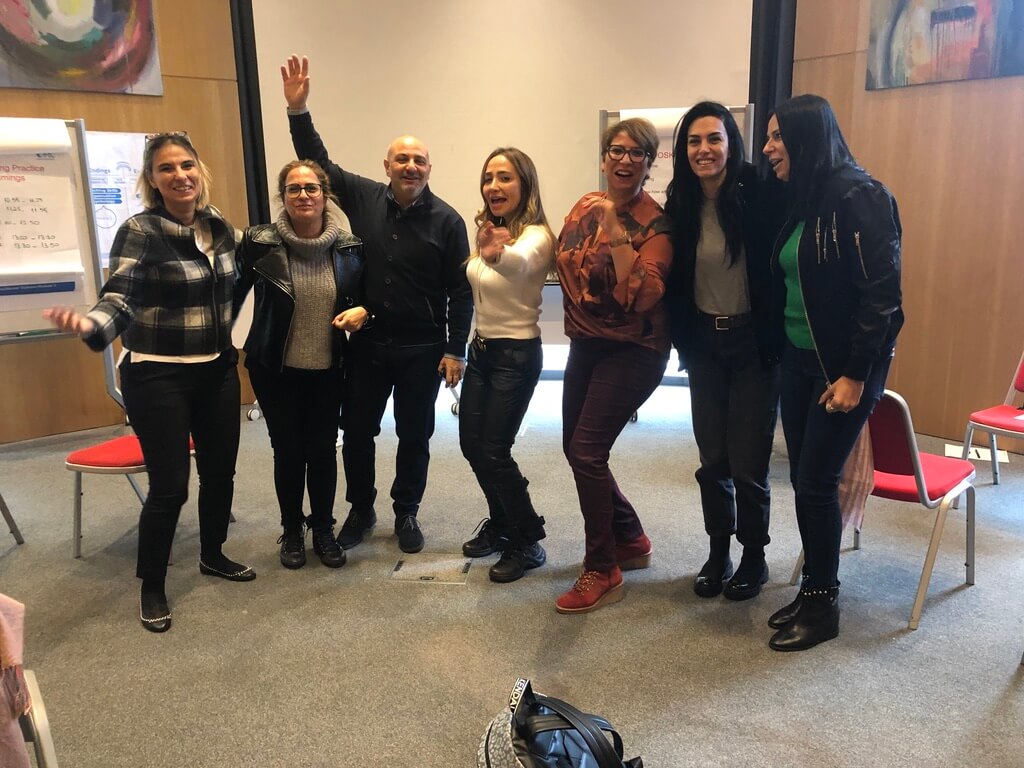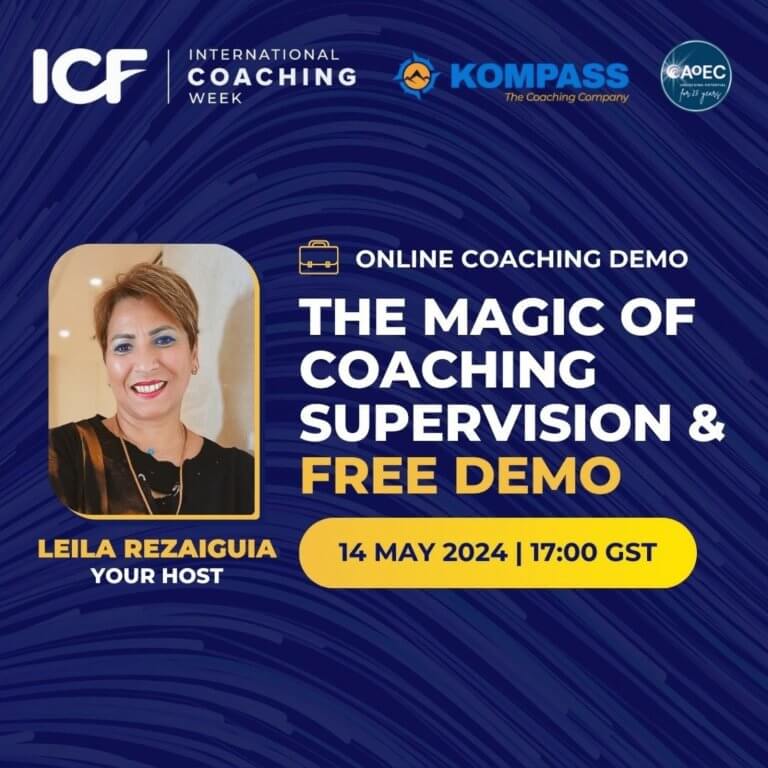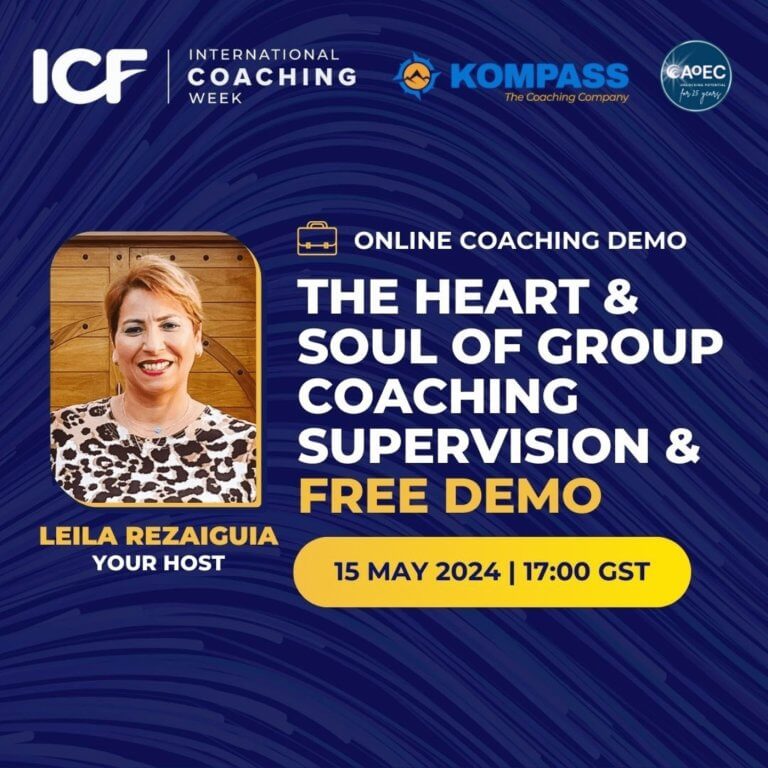Becoming an ICF-certified coach isn’t easy. But it’s a worthwhile undertaking if you want to make a positive impact on people’s lives while gaining professional recognition.
The International Coaching Federation (ICF) is recognised for its ethics, global standards, and commitment to maintaining clear regulations in coaching, which help accredited coaches deliver high-quality, responsible, and ethical services to their clients.
Getting this certification verifies your coaching skills and makes you stand out as a reliable coach in the industry.
As a provider of coaching programmes, we at Kompass Consultancy have created a step-by-step guide on how to become an ICF-certified coach in Abu Dhabi or the UAE as a whole to simplify your application process.
[Table of Contents with jump links]
What is the International Coaching Federation (ICF) Coaching Certification?
The ICF coaching certification is a professional credential that shows you’ve been trained to coach people effectively. It proves you’ve completed a programme that meets the highest global standards in coaching. It also confirms that you follow the ICF’s values and code of ethics.
For many aspiring coaches, this certification is a decisive step forward. It gives you confidence in your skills, and more importantly, it builds trust with your clients.
If you’re living in the UAE or planning to coach here, having an ICF certification also makes you more recognised and respected. It’s a signal that you’re committed to growth, quality, and service.
Credential Comparison Chart |
||||
|
Credential Level |
Coaching Experience Required |
Mentor Coaching |
ICF Accredited Training |
Exam Required |
|
ACC |
100 hours |
10 hours |
✓ |
✓ |
|
PCC |
500 hours |
10 hours |
✓ |
✓ |
|
MCC |
2,500 hours |
10 hours |
✓ |
✓ |
3 Levels of ICF Credentials
The ICF offers three main coaching credentials: ACC, PCC, and MCC. These stand for Associate, Professional, and Master Certified Coach. Each level reflects your coaching experience, training, and skill development.
1. Associate Certified Coach (ACC)
The ACC is the first level of the ICF credential. It shows that you’ve completed ICF-accredited training and have started practising coaching with real clients. You need at least 100 hours of coaching experience and 10 hours of mentor coaching.
This level is perfect if you’re starting your coaching journey or transitioning from another profession into coaching. It proves you have the foundational skills to support others through coaching conversations.
2. Professional Certified Coach (PCC)
The PCC is the second level of the ICF credential. It requires at least 500 hours of coaching experience, along with deeper training and mentorship. This level shows that you can work with a broader range of clients and offer stronger, more consistent results.
Most executive coaches and experienced practitioners aim for this level. If you want to stand out in corporate, wellness, or life coaching, the PCC can give you that extra edge.
3. Master Certified Coach (MCC)
The MCC is the highest level of the ICF credential. To apply, you need at least 2,500 hours of coaching experience and advanced training. This level is for seasoned coaches who have truly mastered the art and presence of coaching.
Becoming an MCC shows a high level of skill, wisdom, and emotional intelligence. Many MCCs also train or mentor other coaches, helping to raise the standard of coaching worldwide.

10 Steps to Become an ICF Coach in the UAE
Step 1: Learn About The ICF Certification Requirements
To become an ICF coach, you must meet specific training and experience requirements. These include specific hours of coach training, practice, and mentoring. It’s essential to understand these clearly before you start.
Start by exploring what type of coaching you feel called to—whether it’s life coaching, executive coaching, or wellness-focused. Take time to learn about the ICF’s values, code of ethics, and key competencies. Once you know the foundation of what you will do, you can align your skills with the ICF standards.
Step 2: Choose an ICF-Accredited Coach Training Programme
The next step is to enrol in a coach training programme that the ICF approves. This means the programme meets international standards and gives you the skills and tools needed to coach professionally. Only ICF-accredited programmes will count toward your certification.
Depending on your background and goals, you might choose a diploma, certificate, or professional development course. Each offers a different experience, so it’s important to be mindful of the type of course you select, especially if you’re planning to become an ICF-certified executive coach in the UAE.
Step 3: Complete the Required Coaching Hours
To earn your ICF credential, you need to complete a set number of coaching hours. These hours include real coaching sessions with actual clients, both paid and unpaid. It’s one of the main ways ICF checks that you’ve gained practical experience.
The number of hours required depends on the level of certification you’re aiming for. For example, the ACC level needs at least 100 hours, while the PCC requires 500 hours. These sessions help you grow as a coach by applying what you’ve learned in real situations. It’s a good idea to start tracking your hours from the beginning.
Step 4: Choose Your ICF Certification Level
There are three levels of ICF certifications: Master Certified Coach (MCC), Professional Certified Coach (PCC), and Associate Certified Coach (ACC).
If you’re just getting started, the Associate Certified Coach (ACC) is a great place to begin. As you gain more hours and confidence, you can move toward becoming a Professional Certified Coach (PCC) and eventually a Master Certified Coach (MCC).
Step 5: Receive Mentor Coaching (10 hours)
Mentor coaching is a required part of becoming an ICF-certified coach. You’ll need at least 10 hours of guidance from a qualified ICF credentialed coach. Through them, you’ll be able to hone and sharpen your coaching skills.
It’s essential to recognise the boundaries between mentoring and coaching. A mentor coach helps you reflect on how you coach, not on what direction your coaching business should take. You will most definitely benefit from this step, as mentor coaching is one of the eligibility requirements for acquiring an ICF certification.
Step 6: Prepare and Pass the ICF Credentialing Exam
To reach the PCC and ACC levels, you must pass the ICF Credentialing Exam, which replaced the ICF Coach Knowledge Assessment (CKA) on May 31, 2023. This exam will test your coaching ethics, core competencies, and principles.
You’ll need to review the ICF Credentialing Exam blueprint along with other study materials to be fully prepared for this exam.
Step 7: Submit Your Coaching Application to ICF UAE
Be sure to complete the coaching application process on the ICF official website. Here, you will fill in details such as coaching hours, ICF mentor coaching, training, and more.
Note that your application will only be valid after you’ve forwarded all the necessary documents and met all the eligibility criteria.
Step 8: Await ICF Approval
Once you’ve submitted your official application, ICF UAE will review and verify if your supporting documents meet the standards of the selected certification level. While this process may take a few weeks, we recommend being patient.
Step 9: Renew Your ICF Credentials Every Three Years
ICF certifications for coaching have a three-year validity. You will need to renew your credentials upon expiration by showing proof of your professional development and coaching practice.
We encourage you to stay up-to-date with coaching trends so that you continue to grow and excel in your coaching career.
Step 10: Consider Joining ICF Membership (optional but recommended)
While this is not a requirement for certification, you may want to consider applying for an ICF membership. You can apply for an ICF membership through their website.
Becoming an ICF UAE member can get you plenty of benefits. You may get discounts on ICF certification fees as well as network with other ICF certified coaches. These are only some benefits you can enjoy as a member.
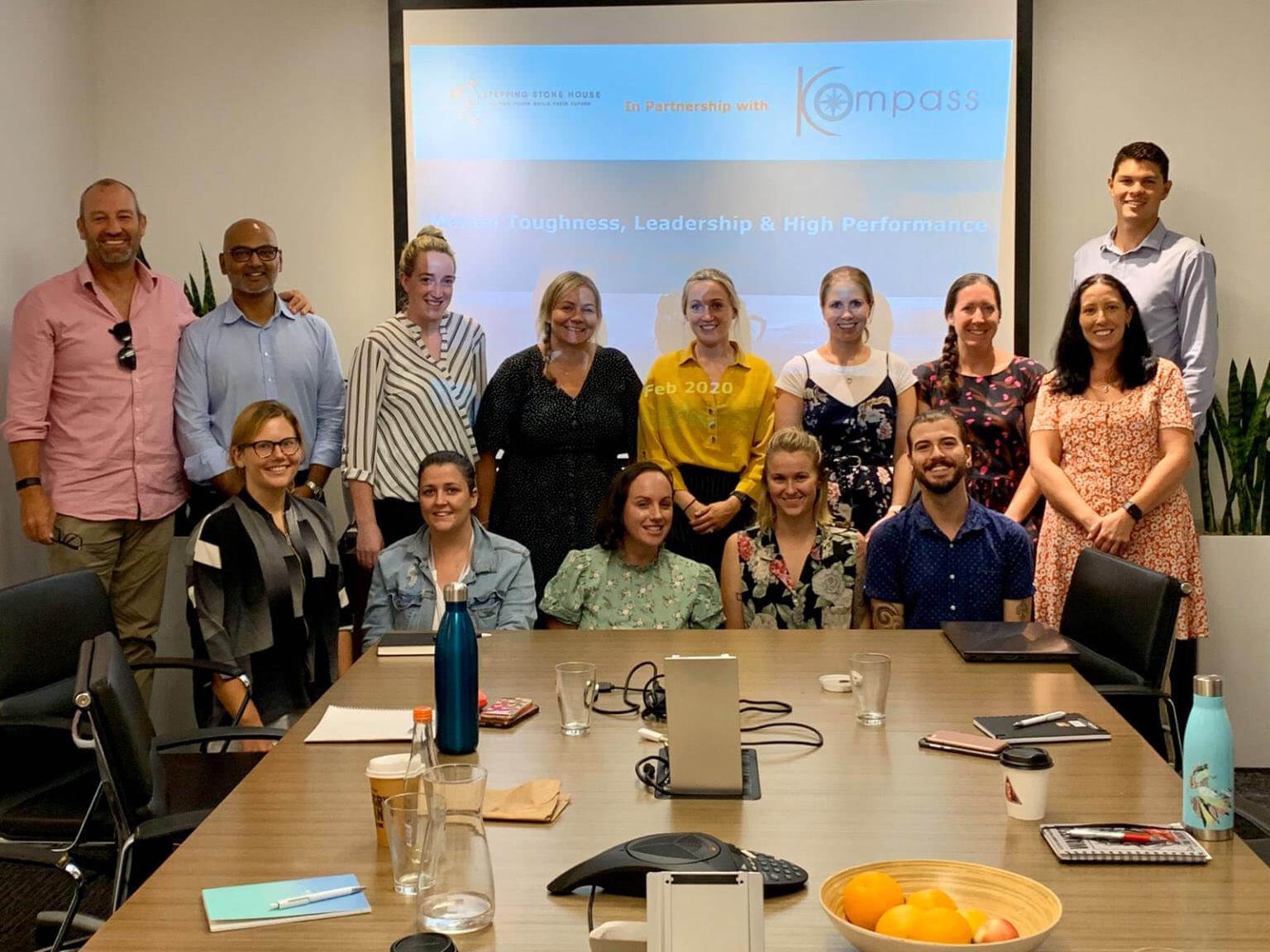
Factors to Consider When Choosing an ICF Coaching Programme in the UAE
-
Accreditation
The programme you choose must be ICF-accredited. It should meet the ICF’s high standards for coach training. Without this, your hours won’t count toward certification.
Accreditation ensures the course content, delivery, and ethics are aligned with ICF’s global benchmarks. Always look for official recognition such as Level 1, Level 2, or ACTP/ACSTH.
-
Mentorship
Mentorship is a key part of becoming a confident and effective coach. Look for a programme that includes mentor coaching with experienced, ICF-certified mentors.
-
Flexibility
Flexibility matters—especially if you’re balancing work, family, or transitioning careers. The best ICF coaching programmes in the UAE offer options that suit your schedule, such as weekend classes, online learning, or blended formats.

Coaching Certification Programmes Offered by Kompass
1. Practitioner Diploma Programme
In our Practitioner Diploma programme, you’ll develop the essential skills to become an effective coach in the UAE. You’ll discover your coaching style through experiential training and interactive practice sessions.
2. Team Coaching Fundamentals Certificate Programme
If you’re looking for training on team coaching, the Team Coaching Fundamentals Certificate programme is for you. You’ll learn the concepts, models, and theories of team coaching.
You will gain 18 Continuing Coach Education Units (CCEUs), accredited by the ICF after completing this programme.
3. Coaching Supervision Programmes
Our Coaching Supervision programmes include Group Supervision for internal and external coaches, Group Supervision for Team Coaches, and Self-Care-Themed Group Supervision.
In these programmes, we will help you enhance your skills and understand how to become an effective and certified coach for organisations in Dubai.
4. Coaching Skills Training Programme for Professionals
For foundational principles and applications of coaching, the Coaching Skills Training programme is the best choice. This is an ideal coaching course for HR professionals and managers looking to enhance their skills.
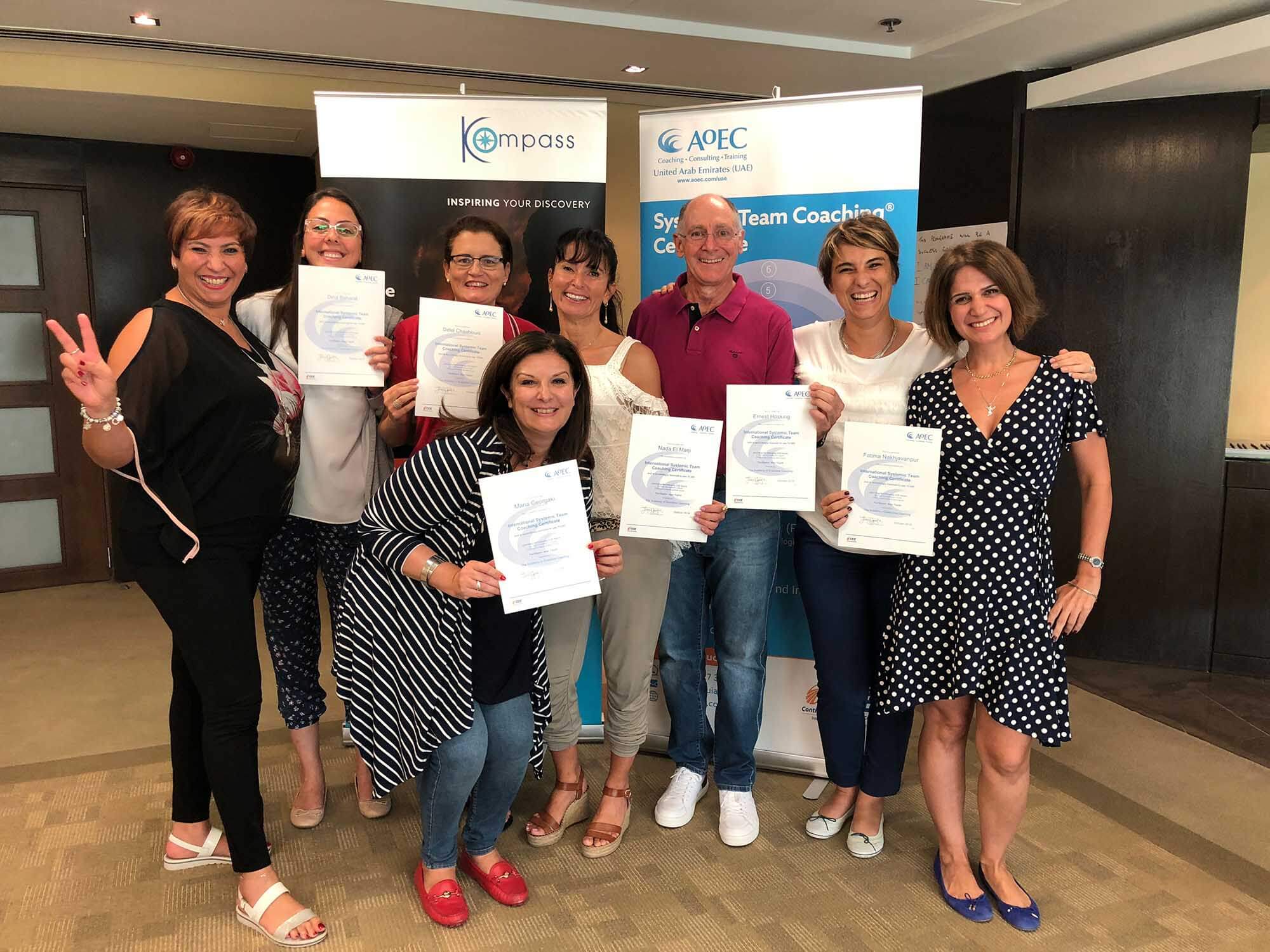
Final Thoughts on How to Become an ICF Certified Coach in the UAE
Becoming an ICF-certified executive coach in Dubai and Abu Dhabi is rewarding but it’s a journey that requires training, commitment, and genuine dedication to the chosen field of expertise.
By following this step-by-step guide on how to become an ICF-certified coach, you can confidently accomplish and pass all the requirements to earn an ICF certification.
Upon approval of your application, you can embark on a fulfilling career as an ICF-certified coach, with the capacity to positively influence individuals and organisations in the UAE and beyond.
Frequently Asked Questions
What does a Level 1 coaching certification mean?
A Level 1 coaching certification is an ICF-approved training programme for beginner coaches. It meets the requirements to apply for the Associate Certified Coach (ACC) credential. You’ll need at least 60 hours of coach-specific training and 10 hours of mentor coaching.
How can I find ICF-certified coaches in the United Arab Emirates (UAE)?
You can search for ICF-certified coaches using the ICF Credentialed Coach Finder tool on the official website. It lets you filter by location, language, and credential level. This is helpful if you’re looking for a mentor coach or want to connect with other professionals in Dubai.
How much does executive coach certification cost in Dubai?
The cost of certification training in Dubai depends on the programme provider, training hours, and whether the course is online or in-person. Aldo, ICF application fees also apply based on the credential level.
Do I need to live in Dubai to become an ICF-certified executive coach there?
No, you don’t have to live in Dubai, but training from an ICF-accredited provider that operates in or understands the UAE market can be helpful.
How long does it take to become an ICF-certified coach?
Most people complete the training and coaching hours in 6 to 12 months, depending on their schedule. The process includes training, mentoring, practical coaching, and a final credentialing exam. You can progress at your own pace as long as you meet the ICF’s criteria.


